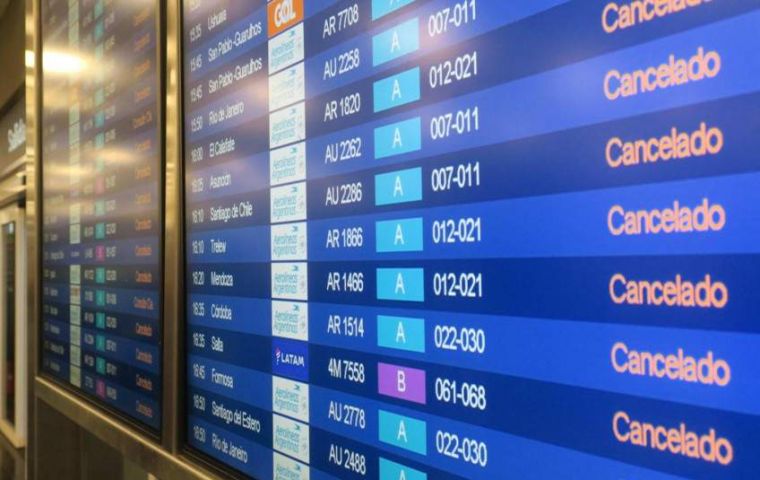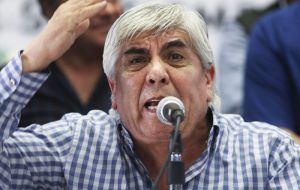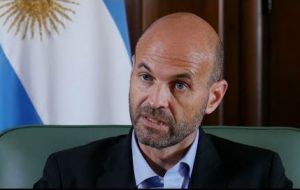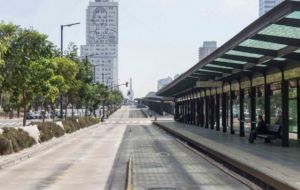MercoPress. South Atlantic News Agency
Unions and opposition promote 24-hour strike paralyzing Argentina
 The strike paralyzed public transport while all flights to and from the country's airports were canceled. Banks, schools and universities remained closed
The strike paralyzed public transport while all flights to and from the country's airports were canceled. Banks, schools and universities remained closed  “The strike has been followed because there has been no response, no government reaction to our demands,” said Hugo Moyano, an influential union leader
“The strike has been followed because there has been no response, no government reaction to our demands,” said Hugo Moyano, an influential union leader  Transport Minister Dietrich complained people have been left hostages.“Last time there was a general strike, some transport operated and the people went to work”
Transport Minister Dietrich complained people have been left hostages.“Last time there was a general strike, some transport operated and the people went to work”  This is the fifth general strike since Macri came to power four years ago, more than in the eight years of former president Cristina Fernandez
This is the fifth general strike since Macri came to power four years ago, more than in the eight years of former president Cristina Fernandez Opponents of Argentina's President Mauricio Macri launched a 24-hour strike on Wednesday to protest the government's inability to reduce inflation that has reached 55% over the past year. The strike paralyzed public transport while all flights to and from the country's airports were canceled. Banks, schools and universities remained closed.
Hospitals were only attending to emergencies while many shops kept their shutters down due to the lack of buses and trains to bring employees to work.
The strike came after a partial job action in late April when tens of thousands of Argentines demonstrated, and transport services and businesses were also affected.
Macri's popularity has fallen months before elections later this year, when he hopes to win a second term.
In an effort to reduce the state deficit, his government last year launched an austerity plan that has cut services to low-income Argentines in exchange for a US$56 billion loan from the International Monetary Fund to help the South American country battle its currency crisis and soaring prices.
“The strike has been followed because there has been no response, no government reaction to our demands,” said Hugo Moyano, one of Argentina's most influential union leaders.
With prices rising, Argentina's 44 million people have been hit with a drop in their spending power, and unions are demanding an increase in salaries to keep up.
“There's a huge amount of unhappiness with the government. Many workers voted for this government because it was going to get rid of income tax. They trusted it but this time they won't make the same mistake,” said Moyano, referring to the upcoming elections on Oct 27.
But Transport Minister Guillermo Dietrich complained people have been left “hostages” to public transport during this strike. “Last time there was a general strike, some transport operated and the people went to work,” he said.
This is the fifth general strike since Macri came to power four years ago. The center-right president has been praised by powerful allies for his reforms but widely criticized by ordinary Argentines feeling the pinch.
Ex president Cristina Kirchner was leading opinion polls to challenge Macri, but earlier this month made the shock announcement that she would run for the vice presidency instead, with her former cabinet chief Alberto Fernandez aiming for the top job.
However the former president and several members of her cabinet face trial on corruption charges or are already in jail.
During Cristina Fernandez eight years, public utility rates were frozen and transport highly subsidized, causing mounting budget deficits and even worse little or no maintenance of grids and oil and gas networks.
Furthermore in the twelve years of Kirchnerism, Argentina a net exporter of oil and mainly natural gas among other things, turned into an energy net importer as investment in the industry simply dried up.




Top Comments
Disclaimer & comment rules-

-

-

Read all commentsWHAT ARE THE BEGGARS UP TO NOW?
May 30th, 2019 - 04:58 pm 0The economy is tanking, inflation is sky high and all Argentines pull up their sleeves and...strike.
May 30th, 2019 - 06:14 pm 0Some people are smarter than others. Just sayin'
When'll the out-flux of the refugees from Argentina begin?
May 30th, 2019 - 11:13 pm 0Commenting for this story is now closed.
If you have a Facebook account, become a fan and comment on our Facebook Page!